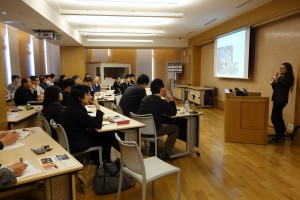NEOPS-A04-2 2nd Symposium/The 31st STIG PoP Seminar
“Managing biodiversity beyond areas of national jurisdiction”
Date: March 17th, 2015. 13:00 – 15:00
Venue: University of Tokyo, Ito International Research Center, Seminar Room
Language: English/Japanese
Organizer: Grant-in-Aid for Scientific Research on Innovative Areas “Exploring Maritime Governance Mechanisms Informed by Maritime Science” (Part of the New Ocean Paradigm on Its Biogeochemistry, Ecosystem and Sustainable Use)
Sponsor: University of Tokyo, Graduate School of Public Policy, STIG Program
![]() Dr. Diz’s presentation slides Marine Bioregionalisation for Ecosystem
Dr. Diz’s presentation slides Marine Bioregionalisation for Ecosystem
![]() Transcript of Dr. Diz’s keynote lecture
Transcript of Dr. Diz’s keynote lecture
[Report]
Following Professor Matsuura’s short introduction to the NEOPS A04-2 group, Dr. Daniela Ditz from WWF Canada provided a keynote lecture on marine bioregionalisation for ecosystem-based management in areas beyond national jurisdictions. In the first part of the lecture, Dr. Diz provided an overview of the marine protected areas (MPAs) under CBD’s Aichi Target 11, referring to progress under the OSPAR convention and the CCAMLR, as well as the CBD’s EBSA criteria. Secondly, she introduced a case of NAFO (Northwest Atlantic Fisheries Organization) that introduced ecosystem-based approach to fisheries management. Thridly, she discussed the prospects of the “Ad Hoc Open-ended Informal Working Group to study issues relating to the conservation and sustainable use of marine biological diversity beyond areas of national jurisdiction (BBNJ)” following its resolution in January 2015 with reference to the areas in which marine science, such as bioregionalization, can contribute to the policy-making.

Professor Kentaro Nishimoto (School of Law, Tohoku University) then provided a synopsis and comments to Dr. Diz’s lecture. He stressed the uniqueness of Dr. Diz’s research that explores ecosystem-based approach under international law schemes. He also pointed to the challenges of embedding bioregionalization into the existing international laws that embody spatial planning requirements and suggested its application to the Japanese marine management policy by referring to a case in Australia.
At the end of the session, Dr. Diz, Professor Nishimoto, and the audience engaged in a discussion about the role of experts in the BBNJ processes as well as the prospects of governing the high seas.
[Program]
13:00 – 13:15 Introduction to the A04-2 project by Prof. Matsuura
13:15 – 14:00 Keynote lecture: Marine Bioregionalisation for Ecosystem-Based Management: Trends, Challenges and Opportunities by Dr. Daniela Diz (WWF Canada, Senior Researcher)
14:00 – 14:20 Comment: Bioregionalization as a Tool for Science-based Ocean Governance by Professor Kentaro Nishimoto(Tohoku University, School of Law)
14:20 – 15:00 Panel Discussion
[Inquiries]
Office for the Science, Technology, and Innovation Governance(STIG) Program
STIG@pp.u-tokyo.ac.jp



